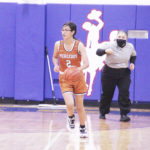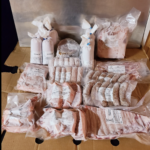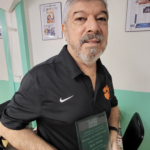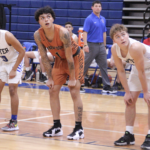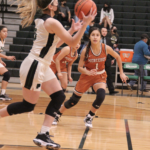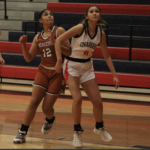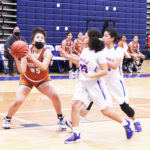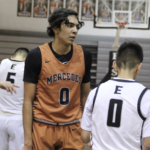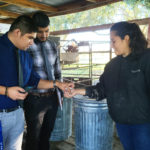Remote Teaching: Harvard graduate thrives using technology in the classroom
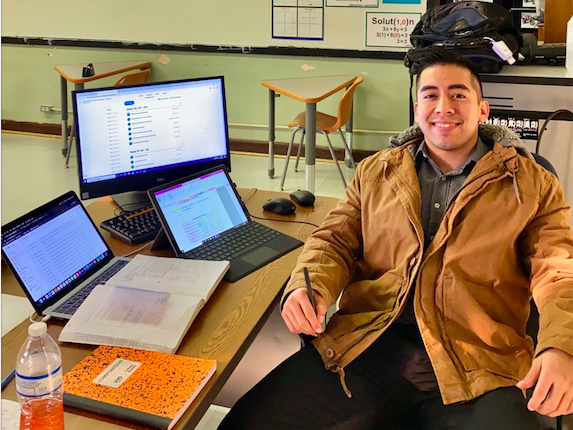
By RAUL GARCIA JR | The Mercedes Enterprise
Mercedes High School teacher Francisco Rodriguez, like many of his peers and teachers across the country, has been teaching remotely since last year after COVID-19 sieged the country leading schools to begin teaching students virtually.
“It’s been crazy but we are doing what we can,” Rodriguez said about having to switch gears from the traditional teaching setting to having to move to the internet and finding ways to engage and teach using technology. At the beginning, we didn’t know how things were going to go and we didn’t know everything was going to be virtual. And we didn’t know it was going to continue like that or not, and we didn’t know what to expect.”
By the end of the 2020 school year, he was teaching virtually and working from home full time in effort to stop the spread of the pandemic.
And from the start of Spring Break 2020 he had not returned to his classroom until August, and only to pick up his things.
“To our surprise virtual learning continued at the new school year,” Rodriguez said. “Now we are actually meeting with the kids every single day.”
Remote learning continued on through Christmas Break and heading into Spring Break 2021.
During the Christmas break Rodriguez completed the requirements to receive his Masters Degree in Mathematics for Teachers from the Harvard University Extension School.
He is scheduled to walk at the next Harvard Graduation Commencement if the school is able to meet safety requirements for the students and attendees.
Rodriguez is a part of a small cohort of Valley teachers who went through the graduate training with the assistance of the Texas Graduate Center.
The Texas Graduate Center is a component of the Texas Valley Communities Foundation headquartered in Mercedes, and has made it possible for more than 50 teachers from Valley schools to earn master’s degrees from world-class universities like Harvard in the disciplines of mathematics, biology, and cybersecurity.
Teachers who have participated in these programs come from school districts throughout the Valley including Mercedes, Weslaco, Donna, San Benito, Lyford, Edinburg, McAllen, PSJA, La Joya and Brownsville.
Rodriguez and his peers studied remotely by night at the Texas Graduate Center and travelled each summer to Harvard for on campus training. The program takes three years to complete.
“I just finished my last class of the Harvard Program,” Rodriguez said. “A bunch of that training was done remotely because I live here and Harvard is in Cambridge. I was able to bring in that experience because I was doing my classes from afar and alot of my professors were teaching their classes the same way I am now so it’s great to know.
“I’m able to put myself in my students’ shoes and tailor my way of teaching to them,” Rodriguez said. “I have actually been in their shoes and that was a plus.”
Now that Rodriguez has completed the Math for Teachers Masters program, he is eager to offer after school tutoring to his students, he said. A service he was unable to do for the last three years due to having to work by day and attend Harvard by night.
“Bombs away if you need tutoring,” Rodriguez said with enthusiasm.
He said learning math is one of those things students have to go through problems and work them out in order to fully understand the concepts.
At the start of every class day, Rodriguez turns on his computers and tablets before the start of his 7:45 a.m. class, and he waits for his Mercedes Early College Academy students to start popping into his virtual Algebra classroom to begin his lessons on exponents and polynomials.
The classroom logs on to Google Meet, and he shares his screen, so his students can see the assignment and follow along with the lesson.
“I’m able to talk to them, and as I’m doing my notes I’m able to teach them,” Rodriguez said about sharing his computer screen with students. “And whatever I have on my screen they can see on their screen. I’m able to transform my assignments from pen and paper to more interactive stuff online. I don’t just want to give them an assignment, and they take a picture of it and then I correct it.”
Rodriguez teaches up to 150 students between his Algebra and Algebra II courses at the Mercedes Early College Academy.
“It’s got to the point for them it feels like they’re in class. We have our routine down, they know what to expect,” Rodriguez said.
“I’m able to engage with them and a lot of them talk back and fourth in the chat room and now we have developed the report and we have discussions in the class.”
Rodriguez alternates every other week teaching from his classroom and from home.
“Some of the kids that I have interacted with are still scared to go to HEB,” Rodriguez said. “What is being affected the most is their social interaction development. In a way, I have been that person for them. When you get to have that with your teachers it’s a breath of fresh air.”
He said one of the most popular assignments he hands out is called Pixel Art.
“I give them a problem and they solve it and if it’s right they earn a color block, and after finishing the assignment they earn their pixels that turn into an image,” Rodriguez said. “Little by little the image will appear. It’s really popular with my 13 and 14 year olds.”
He said, “I’ve gone from a teacher who just stands at the board just lecturing to being able to present my students with a new concept and we are able to explore that concept without me explaining every single thing that they need to know.”
“I’ve done my best to simulate what they would be learning in the classroom although they are not. The technology has been helpful,” Rodriguez said. “It’s definitely been an experience, and who knows how long this is going to last, but we are giving the kids every chance to learn and still be successful.”

